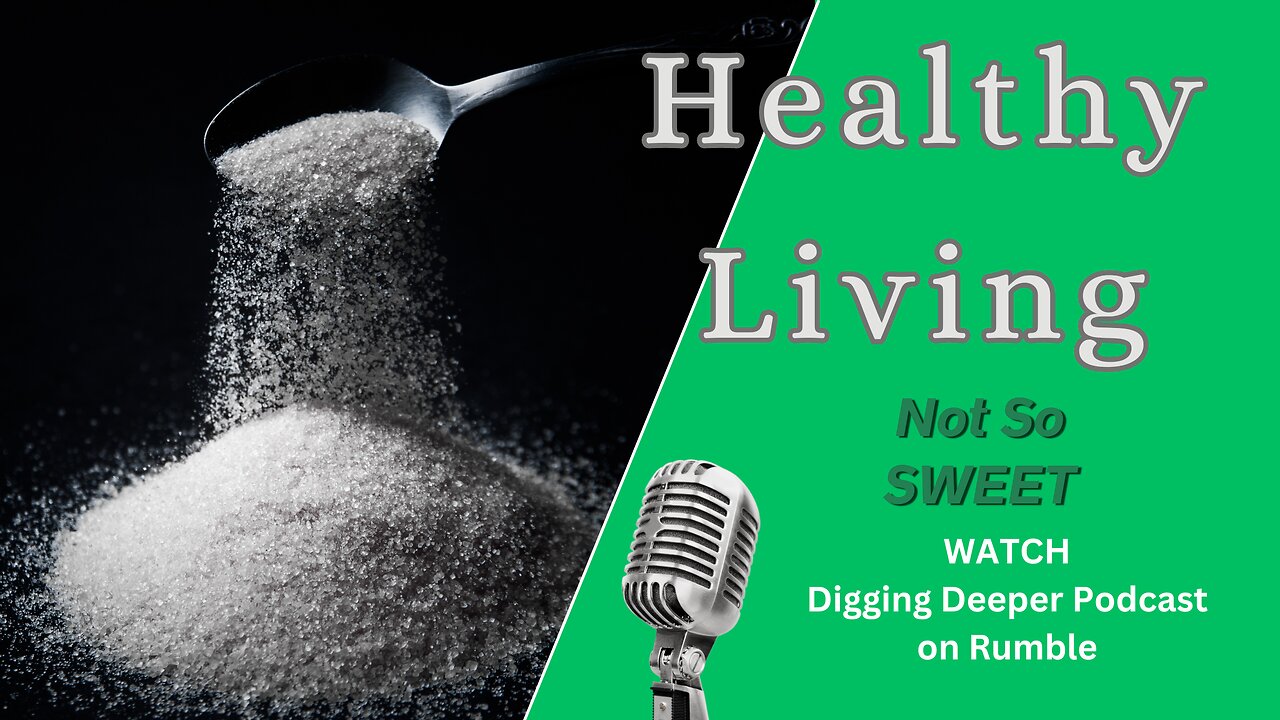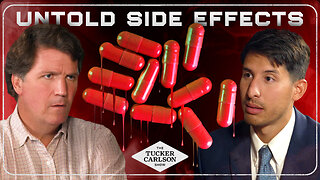Premium Only Content

Healthy Living; Not So SWEET
Artificial sweeteners can sound like a dream come true. All that sweet taste but no actual sugar and no (or very few) calories sounds great!
In our Glucose Overload article we reported that most American consumers are so addicted to sugar that they will deny their addictions in the same way that a crack or heroin addict might. Sugar is, essentially, a legalized recreational drug that’s socially acceptable to consume. And yet, just like other drugs, it destroys a person’s health over time, rotting out their teeth, disrupting normal brain function, promoting heart disease and directly causing diabetes and obesity.
So we know sugar is not good for you, but we love sweet, so what do we do about that? Well we know what the food industry did. They created fake sugar out of chemicals, not once but several times.
Artificial sweeteners can sound like a dream come true. All that sweet taste but no actual sugar and no (or very few) calories? Yes, please! But artificial sweeteners come with concerns of their own.
Just as with sugar, artificial sweeteners may cause you to crave more sweet and sugary foods.
Artificial sweeteners often include sugar alcohols. One sugar alcohol commonly used in artificial sweeteners, erythritol, has been linked to increased risk for heart attack and stroke.
Some researchers suggest artificial sweeteners may be linked to a range of other health conditions, including having obesity, hypertension, Type 2 diabetes, heart disease and more. Those outcomes haven’t been validated across the board, though. Research is still ongoing.
So let’s name these sugar substitutes and dig into their benefits, or lack thereof.
Increases in obesity, diabetes, and metabolic syndrome has led to a shift toward low-calorie artificial sweeteners. The United States Food and Drug Administration (US-FDA) authority has approved six nonnutritive sweeteners [NNS] (saccharine, aspartame, sucralose, neotame, acesulfame-K, and stevia) for use in humans and has classified them under generally recognized as safe (GRAS) category.
Acesulfame potassium (Sweet One, Sunett) is 200 times sweeter than sugar.
Aspartame (NutraSweet, Equal) is 200 times sweeter than sugar.
Neotame (Newtame) is 7,000 to 13,000 times sweeter than sugar.
Saccharin (Sweet’N Low) is up to 700 times sweeter than sugar.
Sucralose (Splenda) is 600 times sweeter than sugar.
Luo han guo (Monk Fruit in the Raw) is 200 times sweeter than sugar.
Purified stevia leaf extracts (Truvia, PureVia, others) is 400 times sweeter than sugar..
I got some bad news …
Extensive marketing by the manufacturers has led to overuse, and sometimes even abuse of NNS, by the population. They are believed to suppress hunger and appetite, leading to beneficial effect on body weight and cardiometabolic profile and are consumed by both lean and obese alike. A huge number of diabetic patients too opt for these “sugar-free” sweeteners as a substitute for sugar in their diet.
Some research on long-term, daily use of artificial sweeteners suggests a link to a higher risk of stroke, heart disease and death overall.
Other research is looking at long-term use of sugar substitutes and the gut. Many focus on how the gut and brain communicate. Researchers are checking to see if sugar substitutes affect cravings for sweets, the way people feel hunger and how the body manages blood sugar.
In the early 1970s, saccharin was linked with the development of bladder cancer in laboratory rats. Since then, the FDA has conducted “extensive research” on saccharin. In 2000, the U.S. government removed the requirement for a warning label on foods and drinks made with saccharin.
Sugar alcohols, stevia and luo han guo can cause bloating, gas and diarrhea. The amount of sugar alcohol that causes these symptoms varies from person to person.
An observational study done in France studied 100,000 adults and found that those consuming aspartame and other artificial sweeteners, especially in larger amounts, had higher risk of cancer.
The World Health Organization (WHO) listed aspartame as “possibly carcinogenic to humans” on July 14, 2023. Aspartame is found in the majority of diet sodas like Diet Coke and Diet Pepsi, some Snapple drinks, gum and even some yogurts and candies.
In the Multiethnic Study of Atherosclerosis, daily consumption of diet drinks was associated with a 36% greater risk for metabolic syndrome and a 67% increased risk for type 2 diabetes. Aren’t these diseases that artificial sweeteners may help prevent in the first place?
Overstimulation of sugar receptors from frequent use of these hyper-intense sweeteners may limit tolerance for more complex tastes. That means people who routinely use artificial sweeteners may start to find less intensely sweet foods, such as fruit, less appealing and unsweet foods, such as vegetables, downright unpalatable.
In other words, use of artificial sweeteners can make you shun healthy, filling, and highly nutritious foods while consuming more artificially flavored foods with less nutritional value.
Start reading labels – if you can’t pronounce it then it probably shouldn’t be in your food. Eat real, whole foods, grass-fed meats, organic produce and minimal sweets and kick sweetners like aspartame to the curb.
-
 1:01:22
1:01:22
Digging Deeper Original Podcasts
6 months agoThe Ugly Truth; Maui on the Mainland
3.49K1 -
 44:44
44:44
Scammer Payback
7 hours agoCrazy Confrontation with Hacked Scammer Group
1K1 -
 1:09:00
1:09:00
vivafrei
2 hours agoKamala Harris Security Being "Pulled"? Kilmar Wants Trump Admin GAGGED! Fake News GALORE & MORE!
50K13 -
 1:33:32
1:33:32
The Quartering
4 hours agoContest Winners Picked, More Trans Attacks, SNL Collapsing, Raja Jackson STILL Not Arrested!
184K154 -
 1:19:44
1:19:44
Mark Kaye
4 hours ago🔴 Kamala FURIOUS Over Trump's Latest Move!
18.3K6 -
 LIVE
LIVE
LumpyPotatoX2
1 hour agoSkate: Early Access - #RumbleGaming
97 watching -
 21:14
21:14
Jasmin Laine
2 hours ago“Absolute Nonsense Policy”—CBC Guest DROPS Savage TRUTH! Poilievre LEAVES Reporters SPEECHLESS
10.8K8 -
 LIVE
LIVE
LFA TV
10 hours agoLFA TV ALL DAY STREAM - FRIDAY 8/29/25
1,532 watching -
 2:01:48
2:01:48
The Charlie Kirk Show
5 hours agoZero Percent Approval Democrats + Two Million Deportations | Bergquam, Sec. Noem, Bowyer | 8.29.2025
61.6K29 -
 1:52:52
1:52:52
Tucker Carlson
3 hours agoSSRIs and School Shootings, FDA Corruption, and Why Everyone on Anti-Depressants Is Totally Unhappy
49K67